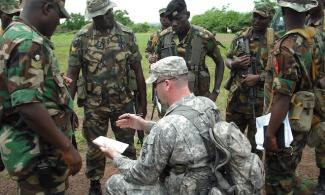
The US will most likely be sending dozens of Special Forces advisers to Nigeria in order to assist in the counterinsurgency effort against Boko Haram, according to the New York Times.
The US will most likely be sending dozens of Special Forces advisers to Nigeria in order to assist in the counterinsurgency effort against Boko Haram, according to the New York Times.

The deployment is part of a recommendation made by a recent confidential assessment by the top United States Special Operations commander for Africa, Brigadier Gen. Donald C. Bolduc.
The report further recommended that a portion of the Special Forces units be deployed in the city of Maiduguri in order to better coordinate the war against Boko Haram with the Nigerian military.
If the recommendation is approved, which is expected, it would mean American troops will be 100 miles closer to the fight against Boko Haram. In 2014, the group was categorized as the world’s deadliest terrorist group beating out the Islamic State.
The Special Forces units would serve in a strict non-combat role, and would primarily be deployed to assist in training and advising African soldiers.
The decision is part of a wider strategy by the Obama White House to combat global terrorism by using Special Forces to train local troops.
Jennifer Cooke, the Africa director at the Center for Strategic and International Studies in Washington, noted the wisdom of the move.
“Rather than entangle U.S. combat forces on the ground, help build the capacity of regional forces to tackle their countries’ security challenges.”
“Training and advising and perhaps imparting the lessons we learned the hard way is a good thing,” Mrs. Cooke said during her testimony to the US Congress.
The cooperation between the Nigerian and American security services are viewed as a sign that relations between the two countries are improving after they reached an all time low in 2014 when the US refused to allow the sale of American-made Cobra attack helicopters to Nigeria by Israel.
These days the relationship seems to be improving, the head of the Pentagon’s Africa Command, General David M. Rodriguez hosted General Abayomi Gabriel Olonisakin, Nigeria’s top chief of defense staff, in Stuttgart, Germany.
In addition, it was announced that American training of a Nigerian infantry battalion, which had previously been suspended, would resume.
Groups such as Human Rights Watch and Amnesty International have condemned the Nigerian military for committing crimes against humanity in its war on Boko Haram. Amnesty International published a damning report listing the various war crimes committed by the Nigerian security services.
President Muhammadu Buhari made the defeat of Boko Haram one of his primary campaign pledges. Late last year he declared the group “technically defeated” arguing that the terrorists had lost significant territory.
However, a loss of territory has not diminished Boko Haram’s ability to carry out deadly attacks on soft targets such as civilians. Borno State in particular has been hit with a rash of suicide bombings and raids by the group throughout the early part of 2016.
Since 2009, the Boko Haram insurgency has left thousands dead and forced many more into Internally Displaced Persons (IDPs) camps.